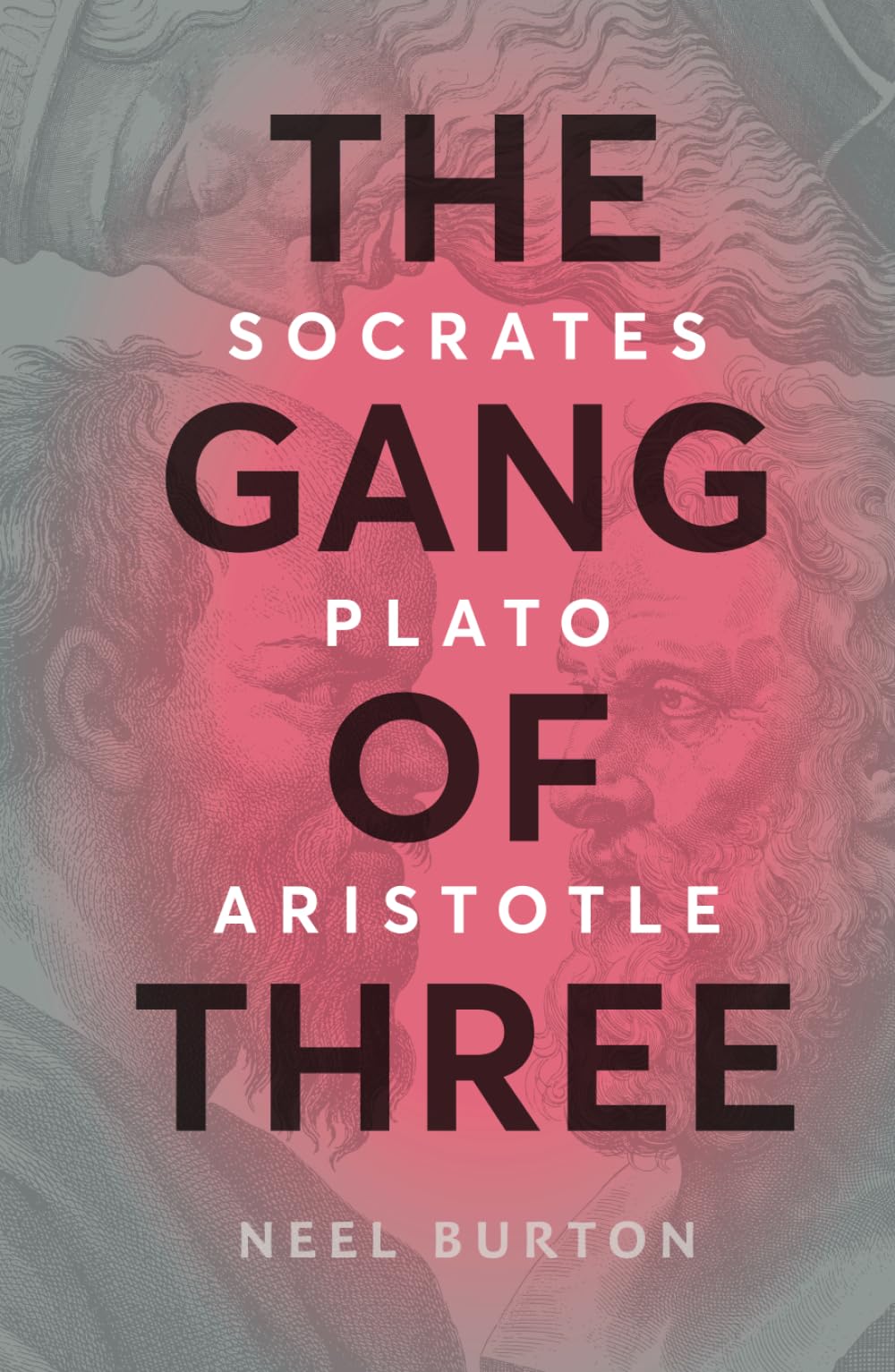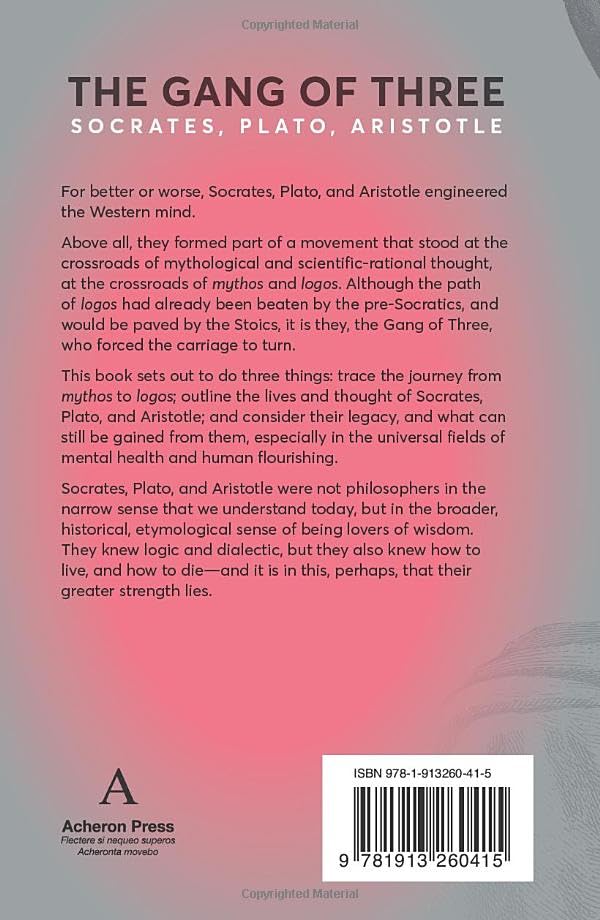How they changed the world, and how they can change it again. This is the best book on philosophy I have ever read, and I have four master’s degrees. –Philip van Heusen for Readers’ Favorite For better or worse, Socrates, Plato, and Aristotle engineered the Western mind. Above all, they formed part of a movement that stood at the crossroads of mythological and scientific-rational thought, at the crossroads of mythos and logos. Although the path of logos had already been beaten by the pre-Socratics, and would be paved by the Stoics, it is they, the Gang of Three, who forced the chariot to turn. This book sets out to do three things: trace the journey from mythos to logos; outline the lives and thought of Socrates, Plato, and Aristotle; and consider their legacy, and what can still be gained from them, especially in the universal fields of mental health and human flourishing. Socrates, Plato, and Aristotle were not philosophers in the narrow sense that we understand today, but in the broader, historical, etymological sense of being lovers of wisdom. They knew logic and dialectic, but they also knew how to live, and how to die–and it is in this, perhaps, that their greater strength lies. Anyone who loves philosophy, history, and the history of ideas will thoroughly enjoy reading Burton’s book. –The US Review of Books Burton offers abundant insights, and effectively connects the work of three famous philosophers to the struggles of modern-day readers. –The BookLife Prize Precise and profound without being pedantic … A government of the wise and virtuous that seeks the happiness of all seems as far away as ever. This book brings us near the philosophers who troubled to think through these things. –Relibro As humanity faces deepening crises, Burton is increasingly turning to the wisdom of the ancients for answers. Through his work, he seeks to bridge the gap between ancient philosophy and modern challenges, offering insights that resonate deeply in today’s troubled world. –Plato’s Academy Centre, Athens Contents Preface Introduction Part I: The Presocratics and Sophists 1. The Pre-Socratic Movement 2. The Milesian School: Thales, Anaximander, Anaximenes 3. The Second Pre-Socratic Phase: Pythagoras, Xenophanes, Heraclitus, Parmenides 4. The Third Pre-Socratic Phase: Empedocles, Anaxagoras, Democritus 5. The Sophists: Protagoras, Gorgias, Prodicus, Hippias Part II: Socrates 6. History of Athens up to the Time of Socrates 7. The Socratic Question 8. Socrates at First 9. Socrates on a Mission 10. Socrates at War 11. Socrates in Love 12. Socrates on Trial Part III: Plato 13. Life and Works 14. Meno 15. Phaedo 16. Phaedrus 17. Republic 18. Theaetetus Part IV: Aristotle 19. Life, Biology, and Works 20. Practical Sciences: Ethics and Politics 21. Organon: Logic and Dialectic 22. Productive Sciences: Rhetoric and Poetics 23. Theoretical Sciences: Physics and Metaphysics Conclusion: The Gang of Three * Grab your copy now and rise into the greatest minds that ever lived.
The Gang of Three: Socrates, Plato, Aristotle (Ancient Wisdom)
$39.99
This book provides a historical and philosophical education on the foundational thinkers of Western civilization.
The Gang of Three: Socrates, Plato, Aristotle (Ancient Wisdom)
$18.99
This book provides a comprehensive introduction to the foundational philosophers of Western thought, supporting studies in history and humanities.
How they changed the world, and how they can change it again. This is the best book on philosophy I have ever read, and I have four master’s degrees. –Philip van Heusen for Readers’ Favorite For better or worse, Socrates, Plato, and Aristotle engineered the Western mind. Above all, they formed part of a movement that stood at the crossroads of mythological and scientific-rational thought, at the crossroads of mythos and logos. Although the path of logos had already been beaten by the pre-Socratics, and would be paved by the Stoics, it is they, the Gang of Three, who forced the chariot to turn. This book sets out to do three things: trace the journey from mythos to logos; outline the lives and thought of Socrates, Plato, and Aristotle; and consider their legacy, and what can still be gained from them, especially in the universal fields of mental health and human flourishing. Socrates, Plato, and Aristotle were not philosophers in the narrow sense that we understand today, but in the broader, historical, etymological sense of being lovers of wisdom. They knew logic and dialectic, but they also knew how to live, and how to die–and it is in this, perhaps, that their greater strength lies. Anyone who loves philosophy, history, and the history of ideas will thoroughly enjoy reading Burton’s book. –The US Review of Books Burton offers abundant insights, and effectively connects the work of three famous philosophers to the struggles of modern-day readers. –The BookLife Prize Precise and profound without being pedantic … A government of the wise and virtuous that seeks the happiness of all seems as far away as ever. This book brings us near the philosophers who troubled to think through these things. –Relibro As humanity faces deepening crises, Burton is increasingly turning to the wisdom of the ancients for answers. Through his work, he seeks to bridge the gap between ancient philosophy and modern challenges, offering insights that resonate deeply in today’s troubled world. –Plato’s Academy Centre, Athens Contents Preface Introduction Part I: The Presocratics and Sophists 1. The Pre-Socratic Movement 2. The Milesian School: Thales, Anaximander, Anaximenes 3. The Second Pre-Socratic Phase: Pythagoras, Xenophanes, Heraclitus, Parmenides 4. The Third Pre-Socratic Phase: Empedocles, Anaxagoras, Democritus 5. The Sophists: Protagoras, Gorgias, Prodicus, Hippias Part II: Socrates 6. History of Athens up to the Time of Socrates 7. The Socratic Question 8. Socrates at First 9. Socrates on a Mission 10. Socrates at War 11. Socrates in Love 12. Socrates on Trial Part III: Plato 13. Life and Works 14. Meno 15. Phaedo 16. Phaedrus 17. Republic 18. Theaetetus Part IV: Aristotle 19. Life, Biology, and Works 20. Practical Sciences: Ethics and Politics 21. Organon: Logic and Dialectic 22. Productive Sciences: Rhetoric and Poetics 23. Theoretical Sciences: Physics and Metaphysics Conclusion: The Gang of Three * Grab your copy now and rise into the greatest minds that ever lived.
Additional information
| Weight | 0.499 lbs |
|---|---|
| Dimensions | 14 × 2.5 × 21.6 in |
Reviews
There are no reviews yet.













Reviews
There are no reviews yet.